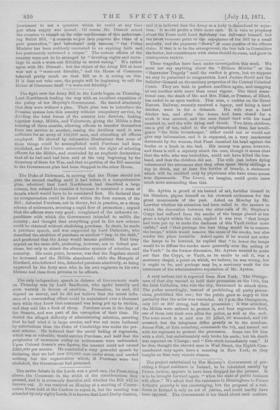The Duke of Richmond, in moving that the House should
not pass the second reading until it had before it a comprehensive plan, admitted that Lord Northbrook had described a large scheme, but refused to consider it because it contained a mass of details which would have to be considered first. He declared that no reorganization could be found within the four corners of the Bill ; defended Purchase, not in theory, but in practice, as a cheap scheme of retirement, securing a rapid flow of promotion ; argued that the officers were very good ; coinp]aiued of the unknown ex- penditure with which the Government intended to saddle the country ; and thought that everything good in the new scheme could be obtained without abolishing purchase. In short, he made a purchase speech, and was supported by Lord Dalhousie, who described the abolition of purchase as another " leap in the dark," and predicted that the Army would become political. Earl Grey argued on the same side, professing, however, not to defend pur- chase, but only to attack the alternative systems of selection and seniority. His main point, however, was that the Regulars should be increased and the Militia abandoned ; while the Marquis of Hertford, who followed him, defended purchase absolutely, as being approved by the forty men who in his own regiment in his own lifetime had risen from privates to be officers.






























 Previous page
Previous page